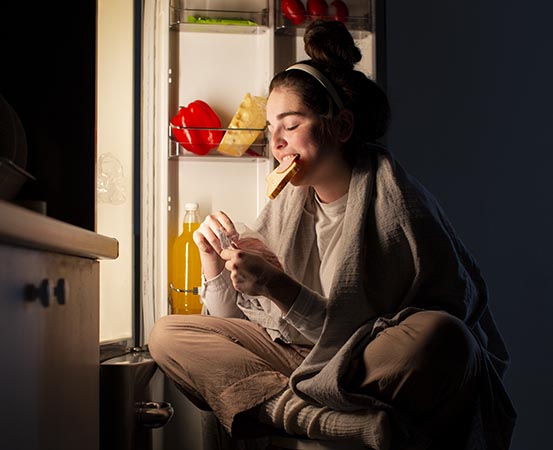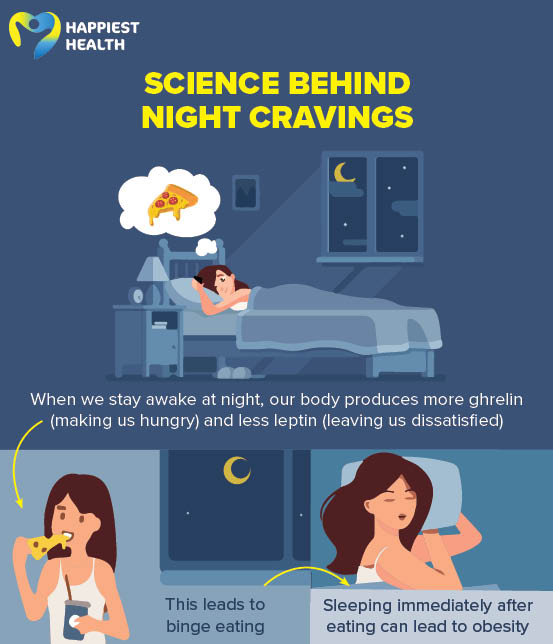
Night cravings refer to the desire of having food late at night. Research suggests that many of us experience night cravings due to improper sleeping patterns. Having a poor diet or eating at untimely hours can also make you hungry at night. A study published in the journal Sleep states that nighttime food cravings can contribute to unhealthy eating behaviors and represent a potential link between poor sleep and obesity.
Nandini, a 24-year-old clinical pharmacist from Hyderabad, tends to crave food around midnight every day. “I try to sleep around 11 pm to 1 am and in the process of falling asleep, I tend to crave for food. I try not to eat, but sometimes I do give in,” she says.
Staying up late (watching television or web series) and snacking in late evenings can lead to night cravings. “When the number of hours that we are awake increases, it entices us to involve in passive activities. It could be watching television or using some sort of gadget. And when we spend enough time doing that, then whatever food we had earlier tends to get digested to a certain extent. So, you tend to crave for food again, usually carbohydrates or unhealthy snacks which are not required at that point of time,” explains Dr Shantanu Tandon, senior ENT surgeon and airway and sleep apnoea specialist, Sakra World Hospital, Bengaluru.
What causes night cravings?
Hormonal imbalance due to improper sleep leads to night cravings. “Ghrelin is a hormone which helps to increase appetite. Irregular sleeping patterns lead to an increased production of ghrelin. There is also a decrease in the production of leptin hormone which is responsible for the feeling of fulfillment. So, whenever you are awake at night, the increased ghrelin production makes you crave for food,” says Dr Deepti Khatuja, head clinical nutritionist, Fortis Memorial Research Institute, Gurugram.
Another reason for night cravings could be the acid levels in your stomach. Dr Priyanka Rohatgi, chief clinical dietician, Apollo Hospitals, Bengaluru, said, “Feeling hungry late at night could be due to several reasons – too much of acid in your stomach from the previous meal, insulin resistance, thyroid malfunction or simply addiction to carbohydrates. Wise food choices, proper hydration and adequate sleep are important to maintain a proper circadian rhythm.”

What happens if you eat at night?
Having a lighter meal at night is important, says doctor Dr Khatuja. “Night meals should be the lightest meal of the entire day. While staying awake at night, you tend to eat processed or carbohydrate-rich food which could cause obesity and degenerative diseases. Eating junk food can impact the circadian rhythm leading to sleeping disturbances which further results in binge eating at untimely hours.”
“Every time we eat food, insulin is released. At night, as there is no physical activity, the food is not used to metabolise anything. Instead, it is directly stored as fat ultimately leading to obesity,” says Dr Tandon.
How to manage night cravings?
A review article published in Journal of Sleep Research has suggested a bidirectional relationship between sleep and risk for obesity and cardiovascular diseases. The results suggest that regular sleeping patterns reduce overall appetite and desire for sweet and salty foods.
Experts recommend the following tips to manage night cravings:
- Maintaining a healthy lifestyle which involves a balanced diet, stress management and good physical activity.
- Having warm food two to three hours before going to sleep.
- Having a diet containing protein, seasonal vegetables, brightly coloured vegetables and fruits which can lead to better sleep cycles.
- Making wise food choices like roasted chana or nuts in case of unavoidable situations (nightshift workers).
- Sleeping early to skip midnight cravings and avoid being up for long hours which disrupts fat metabolism.
- Staying away from gadgets before going to sleep as it can disrupt sleep patterns.
Takeaways
- Irregular sleep patterns and poor diet can cause night cravings leading to disruptions in sleep patterns, obesity and more.
- Maintaining a proper sleep routine, managing stress and having a balanced diet can help to curb night cravings.

















